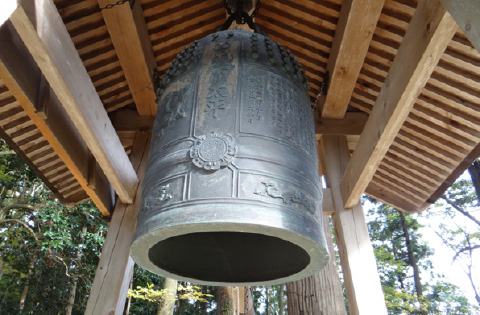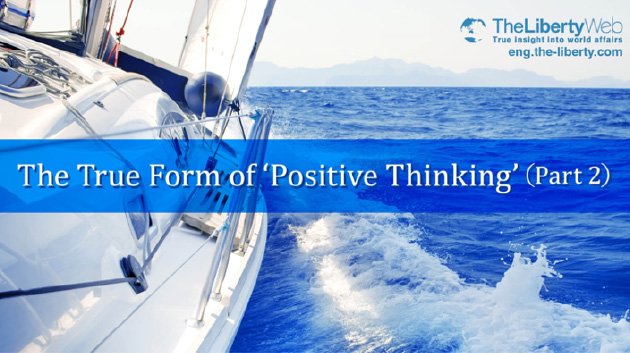The True Form of ‘Positive Thinking’ (Part 2)
We have been taught that ‘In general, life should be approached with a positive mindset.’ However, I believe that a certain level of realism is necessary to avoid shallow positivity. What kind of attitude is necessary to properly maintain this balance?
August 27, 2017, Happy Science Spiritual Lecture Hall
From the lecture, “How I Perceive and Think”
In this day and age, there is a consensus around creating a society that is as equal and democratic as possible, a society in which people can freely work hard and obtain results, but this kind of thinking wasn’t popularized until recent years.
On the contrary, there were longer time periods where social class was based on birth and people couldn’t change their occupation. There weren’t many time periods like today’s where women had this much freedom to express their rights.
In that sense, you cannot be a yacht that only moves forward when the wind is in your favor. You must become a yacht that moves forward even when the wind is blowing against you.
‘Why am I facing so many hardships in my life?’ ‘Only hardships come my way.’ You may be thinking this now, but once you return to the other world, you may look back on what your soul has been experiencing continuously and realize, ‘Ah, I needed those experiences.’
Please have the grit to accept those things.
You should think, ‘There must be a reason why I must experience the difficulties I’m facing. I may not understand it yet in this world, but I will understand when I return to the other world.’ It’s important to do what you must do within your understanding, and do what you can do on your own.
For example, even if you’re thinking that you want to do missionary work and spread my teachings to seven billion people around the world, it’s not something you can accomplish realistically. You can’t spread my teachings to seven billion people, so your hands may be full with guiding the people around you, which may be 50 or 100 people.
Although you may not reach seven billion people, there’s no doubt that you’re one step closer towards your goal. Start off with doing what you can do, before repeatedly voicing your ultimate goal. What is it that you can do with what you’ve been given?
Let’s say that you’re the CEO of a company that employs several thousand people. You could be putting on a good facade and telling your employees, ‘There’s freedom of religion, and you’re free to either believe or not believe,’ just as constitutional scholars and commentators say. But if you think, ‘I believe these teachings to be true,’ you can use different methods to persuade your employees. You can tell them, ‘Since you’re already here at my company, my hope is for you to practice faith while you’re here.’
‘My way of thinking comes from this teaching of Happy Science.’ ‘This is how I became the person I am now.’ By repeatedly telling your employees this, your employees will start to think, ‘Ah. If our CEO is saying it, it might be important to study up on those things.’
The key is to not give up and to do them over and over again; try to move closer to your goal by one or two steps at a time.

Dr. Shoichi Watanabe(*)’s Frustrating Experience
Dr. Watanabe used to say during his lifetime that even though he was more influential than most people, he felt that no one else but his supporters read his books, and others read just to criticize his work. He received many letters of criticism during his lifetime.
For example, when he was fighting against unjust left-wing beliefs, people didn’t believe him because no one else supported what he said. No matter how much he fought, few people believed him. Although his status rose after the War, he was often looked down — ‘Isn’t Dr. Watanabe just a professor at Sophia University?’ ‘Didn’t he graduate from Sophia?’
During the postwar period, Sophia University graduates weren’t top-ranked. I think Sophia University is considered one of the best universities in Japan today, but Dr. Watanabe was often told, ‘In the end, you’re just a professor at Sophia right? There are no notable alumni from Sophia University graduates.’ Amidst these criticisms, Dr. Watanabe became the first notable alumnus, followed by Prime Minister Hosokawa and a few others, but there weren’t many big names.
On the contrary, there were many big-name alumni from the University of Tokyo, Kyoto University, Keio University, Waseda University and Hitotsubashi University. I’m sure Dr. Watanabe had many frustrating experiences when he had to face those alumni and become an advocate for himself.
Dr. Watanabe was the first Japanese person to write a Ph.D. thesis in Germany and have his paper be approved to be published in German. He came back to Japan to publish his grammar book about the German language being developed from English. Dr. Watanabe translated his work to Japanese, but no major language publishers accepted his work.
These publishers looked down on him and offered to publish his work if he paid for the entire cost. He was frustrated because they told him, ‘If you want to publish a language book, you have to at least be a graduate of the University of Tokyo or the Tokyo University of Foreign Studies.’
I’m sure he was thinking, ‘Do they understand what it means for my work to have been published in Germany?’ Dr. Watanabe seemed to have been in dispute because the top publishers didn’t take his work that became a book in Germany, despite him being Japanese. These things happened.
There were preconceptions around his work: ‘They’re just opinions of a Sophia professor.’ ‘He could just be saying things on a whim.’
(*)Dr.Shoichi Watanabe (1930-2017) was an English scholar and a conservative opinion leader in Japan.
Analogy of a Temple Bell
Regarding his criticisms of the self-torturing views of the postwar left wing, especially those that were widely distorted, Dr. Watanabe gave an analogy of a bell.
He said: ‘Push a temple bell with one finger, and you won’t be able to tell if it’s moving. But if you keep pushing it over and over again, the bell will begin to move and create a larger and larger swing. This is my motivation for doing what I do.’
From what I’ve seen, his work wasn’t nearly as insignificant as the push of a temple bell; I think his work amounted to ringing the bell with a metal object at the very least. I’ve read something like that.

(Photo:pixta)
I, myself, also make various statements on public affairs, but not everyone listens to me. My followers listen, but I’m not certain to what extent they believe in my words. Perhaps, some followers believe 100 percent of what I say, while it may be 70 percent or 50 percent for others. Some of them may even disagree with me at times.
Even then, tens of thousands of people make an effort to come listen to me, and others listen over satellite broadcasting. My followers across the world even come out to listen, and my lectures are broadcasted throughout Japan over the radio at times. We’re still at the level of local TV stations, but my Tokyo Dome lecture is played over five stations.
Our work cannot stay at this level from the perspective of our original purpose, but based on the bell analogy, continuous small pushes can create a larger momentum — this is why I often think that it is better to ‘do’ than ‘not do.’
This kind of lecture may not feel valuable for some people, but it is most likely helpful for other individuals. Out of 100 people who listen to my lectures, even if a few people find it valuable to their lives or experience an awakening, I find it extremely meaningful to hold these lectures. This is why I speak about various topics.
All in all, positive thinking doesn’t always guarantee success, and if you think a particular result is guaranteed, you may fail 99 percent of the time. However, given your current abilities and the perspective of your future self, which is ‘what will happen if you go with the flow,’ it is possible to leave a result which you will be proud of for swimming against the current.
I believe there is a high probability of winning, in terms of practicing positive thinking in the battle against yourself.




















